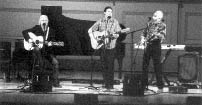Isn't This a Time!
by M. Faust

If nothing else, Harold Leventhal was an important figure in the American folk music scene for booking the folk quartet The Weavers into Carnegie Hall in 1955. A few years earlier, The Weavers were one of the most popular musical groups in the country, with hits like “Wimoweh,” Woody Guthrie’s “So Long, It’s Been Good To Know Ya,” and Leadbelly’s “Midnight Special” and “Goodnight Irene.” But they came under FBI investigation for their outspoken support of international peace, civil rights and workers’ rights, and Weaver Pete Seeger was accused of being a Communist by the House Un-American Activities Committee. When Leventhal booked them for what proved to be a hugely successful show, the group had disbanded, thinking they could never perform again.
For five decades impresario Leventhal was a key figure in the careers of many who found that music could be a valuable expression of dissent at a time of social repression.
Arlo Guthrie performs a holiday concert every Thanksgiving at Carnegie Hall, and in 2003 he decided to use it to honor his mentor Leventhal for his fifty years of service to the music industry. Along with appearances by singers Leon Bibb, Theodore Bikel, and Peter, Paul and Mary, he also managed to reunite The Weavers, now well into their 80s.
Filmmaker Jim Brown, who documented The Weavers in the acclaimed 1980 film Wasn’t That a Time!, came in to film the show, and the movie that resulted works both as a nostalgic visit for longtime fans of this music and an introduction to newcomers. Imbued with a strong sense of family, the performances are both comforting and rousing. Highlights include Bikel’s rendition of a Russian gypsy tune, Weaver Fred Hellerman’s moving solo on “Brother, Can You Spare a Dime,” and the group’s “Sinner Man,” dedicated to George Bush.
Even the musicians’ age works to the film’s advantage, showing that you don’t have to slow down if you don’t want to. (Mary Travers and Weaver Ronnie Gilbert are shown in a backstage sequence having a mock swordfight with their canes.) Arlo Guthrie, the young-un of the show in his mid–50s, recalls the then–84–year-old Seeger worrying that his voice might not be up to the demands of a show, to which he responded not to worry, the hearing of most of the audience isn’t what it used to be, either.
|
Issue Navigation> Issue Index > v5n5: Suing the Governor (2/2/06) > Film Reviews > Isn't This a Time! This Week's Issue • Artvoice Daily • Artvoice TV • Events Calendar • Classifieds |









 Current Issue
Current Issue